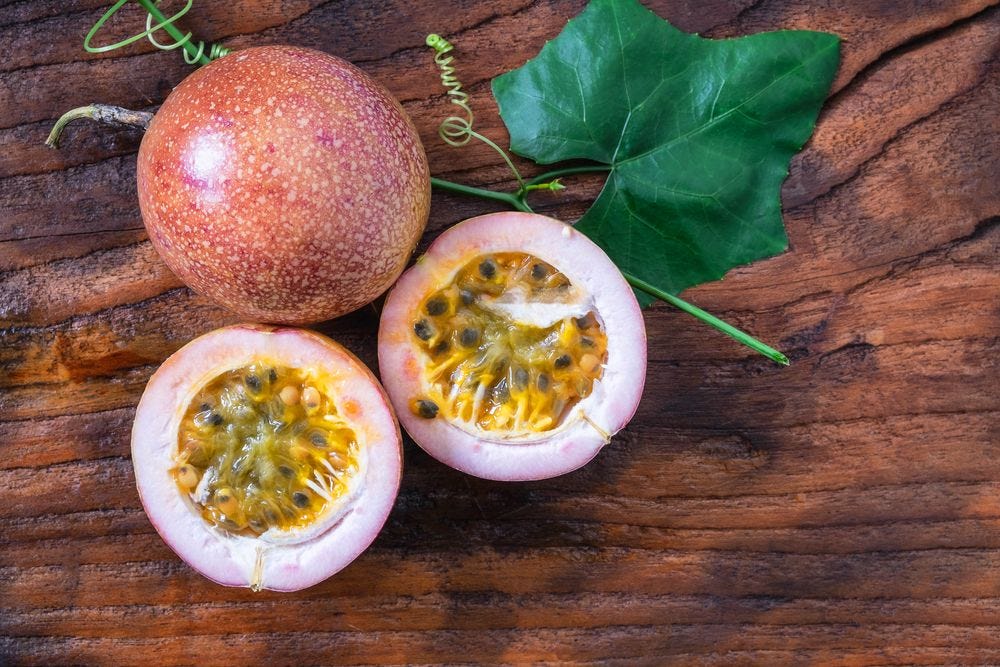assion fruit, a tropical delight with a distinct flavor and numerous health benefits, is more than just an exotic fruit. It is packed with essential nutrients and antioxidants that can contribute to your overall well-being. Whether enjoyed fresh, in juices, or as part of a delicious recipe, passion fruit can be a game-changer for your health. In this article, we will explore the amazing benefits of passion fruit, its nutritional content, and how incorporating it into your diet can lead to a healthier lifestyle.
What is Passion Fruit?
Passion fruit, scientifically known as Passiflora edulis, is a small, round fruit with a tough, vibrant skin that can range from purple to yellow, depending on the variety. Inside, it is filled with sweet, tangy pulp and numerous edible seeds. This fruit is native to South America but is now grown in many tropical and subtropical regions worldwide.
Apart from its delicious taste, passion fruit has earned its status as a superfood due to its impressive nutrient profile and health-boosting properties. It is rich in vitamins, minerals, and antioxidants that can provide multiple health benefits.
Nutritional Content of Passion Fruit
Passion fruit is a nutrient-dense food, meaning it provides a high amount of essential nutrients relative to its calorie content. Here’s a closer look at the key nutrients found in passion fruit:
- Vitamin C: This powerful antioxidant helps boost your immune system, promotes healthy skin, and protects cells from damage caused by free radicals.
- Dietary Fiber: Passion fruit is an excellent source of dietary fiber, which aids digestion, promotes gut health, and helps regulate blood sugar levels.
- Vitamin A: Essential for healthy vision, skin, and immune function, vitamin A found in passion fruit contributes to overall well-being.
- Potassium: This mineral helps regulate blood pressure, supports heart health, and maintains proper muscle function.
- Iron and Magnesium: Both of these minerals are important for energy production, muscle function, and overall metabolic health.
- Antioxidants: Passion fruit is loaded with antioxidants like polyphenols, carotenoids, and flavonoids, which protect the body from oxidative stress and inflammation.
Health Benefits of Passion Fruit
Incorporating passion fruit into your diet can lead to numerous health benefits. Here are some of the most significant ways passion fruit can improve your overall well-being:
1. Boosts Immune Function
Thanks to its high vitamin C content, passion fruit is excellent for supporting a healthy immune system. Vitamin C plays a critical role in stimulating the production of white blood cells, which are essential for fighting infections and diseases. Regular consumption of passion fruit can help ward off colds, flu, and other illnesses by strengthening your body’s defense system.
2. Promotes Digestive Health
Passion fruit is rich in dietary fiber, which is vital for maintaining healthy digestion. Fiber helps regulate bowel movements, prevents constipation, and promotes a healthy gut by supporting the growth of beneficial bacteria. The seeds in passion fruit also contribute to its fiber content, making it a natural remedy for digestive issues.
3. Supports Heart Health
The potassium and fiber found in passion fruit are excellent for maintaining cardiovascular health. Potassium helps regulate blood pressure by balancing sodium levels in the body, while fiber lowers cholesterol levels. Together, these nutrients reduce the risk of heart disease, stroke, and hypertension.
Moreover, the antioxidants in passion fruit, such as flavonoids and polyphenols, help protect the heart by reducing oxidative stress and inflammation, both of which contribute to heart disease.
4. Enhances Skin Health
The antioxidants and vitamins in passion fruit, particularly vitamin C and vitamin A, are beneficial for maintaining healthy, glowing skin. Vitamin C is essential for the production of collagen, a protein that keeps the skin firm and youthful. It also helps repair damaged skin cells and reduces the appearance of wrinkles and fine lines.
In addition, the antioxidants in passion fruit help neutralize free radicals that can damage the skin and lead to premature aging. Regular consumption of passion fruit can promote a radiant complexion and protect your skin from environmental damage.
5. Aids in Weight Management
If you’re looking for a natural way to support your weight loss efforts, passion fruit can be an excellent addition to your diet. It is low in calories but high in fiber, which helps you feel full and satisfied for longer periods. This can reduce your overall calorie intake and prevent overeating.
The fiber in passion fruit also supports healthy digestion and metabolism, both of which are essential for effective weight management.
6. Improves Vision
Passion fruit is a rich source of vitamin A, a nutrient essential for maintaining healthy eyes and good vision. Vitamin A helps protect the cornea, the surface of the eye, and reduces the risk of age-related macular degeneration and cataracts. The antioxidants in passion fruit further contribute to eye health by protecting against oxidative damage that can impair vision.
7. Helps Control Blood Sugar Levels
The fiber in passion fruit not only promotes digestive health but also helps regulate blood sugar levels. Soluble fiber slows the absorption of sugar into the bloodstream, preventing spikes in blood sugar levels after meals. This makes passion fruit a good option for individuals with diabetes or those looking to maintain stable blood sugar levels.
Additionally, the low glycemic index (GI) of passion fruit means it won’t cause rapid increases in blood sugar, making it a diabetic-friendly fruit.
How to Incorporate Passion Fruit into Your Diet
Adding passion fruit to your diet is easy and versatile. Here are some delicious and creative ways to enjoy this exotic superfood:
1. Eat It Fresh
One of the simplest ways to enjoy passion fruit is to eat it fresh. Simply cut the fruit in half and scoop out the pulp with a spoon. You can eat the seeds along with the pulp or strain them if you prefer a smoother texture.
2. Add It to Smoothies
Passion fruit adds a tropical flavor and nutritional boost to your smoothies. Combine the pulp with other fruits like banana, mango, or pineapple, along with yogurt or plant-based milk, for a refreshing and healthy smoothie.
3. Use It in Salads
Passion fruit can add a tangy sweetness to your salads. Drizzle the pulp over mixed greens, avocado, and other fresh vegetables for a vibrant and flavorful salad.
4. Create Desserts and Sauces
Passion fruit is a popular ingredient in desserts and sauces due to its unique flavor. Use it to make passion fruit curd, sorbet, or as a topping for cakes and ice cream. It also pairs well with savory dishes, adding a sweet-tart contrast to fish or chicken.
5. Enjoy Passion Fruit Juice
Passion fruit juice is a refreshing way to hydrate and enjoy the fruit’s health benefits. You can blend the pulp with water or coconut water, and a touch of sweetener if needed, for a delicious homemade juice.
Conclusion
Passion fruit is more than just a tropical treat—it’s a powerhouse of nutrients that can significantly improve your health. From boosting your immune system to promoting heart health, skin vitality, and digestive well-being, the benefits of passion fruit are numerous. Whether you enjoy it fresh, in juices, or as part of your favorite recipes, incorporating passion fruit into your diet is a delicious and effective way to enhance your overall health.
So, why not take advantage of this exotic superfood and let the power of passion fruit transform your health for the better?

